Will Russia collapse/split? (4) After Putin
Note: This article was first published by the media, and the editor gave it the name "The symbiotic relationship between Russia and Putin, how will it end in the future?" " , but with more abridgements. This article is the fourth in the series "Will Russia Collapse/Split?" The first three articles were rebranded/renamed and posted on the end media.
one
Putin is dead, dying of terminal cancer. Data show that since 1992, individualistic dictators like him who have been in power for more than 20 years have ruled for an average of 36 years and a median of 30 years. Therefore, Putin can be regarded as "the business has not been half-way but collapsed in the middle". However, after his death, Russia's political situation is still said to be stable. After a brief hiatus, Russia's current prime minister, Mikhail Mishustin, became acting president, according to the constitution. Over the next three months, Russian operations on the Ukrainian front stalled. It is reported that the Russian government is privately contacting the Ukrainian government to seek a temporary ceasefire. Large-scale but short-lived cheers and demonstrations broke out on the streets of Petersburg and Moscow, and were quickly dispersed by security forces. Relatively quiet across Russia. Moscow Mayor Sergey Sobyanin, Deputy Chief of Staff Dmitry Kozak, Defense Minister Sergey Shoygu, former President Dmitry Medvedev and Nikolai Patrushev, head of Russia's Security Council, have negotiated privately with key figures in Putin's regime, agreeing that the new president will be chosen from among the original staff , the newcomer will be a middle-of-the-road figure who claims to inherit Putin's legacy.
Assessment of the coming year after Putin's death: Russia will maintain the status quo, with a probability of 78%.
Putin is dead, either in a man-made accident (maybe a mutiny/coup/riot) or forced out of power (political death is not much different from natural death for a powerful man). The Russia-Ukraine war, which cost a lot and has no hope of victory, has increasingly affected the lives of ordinary people in Russia. Before Putin's death, his approval rating had dropped from 89% at the peak in 2014 to 20-30%. Participation in protests has risen from a low of 14% in May 2022 to more than 50, 60%. Although Russia's economy experienced only a mild recession during the first year of the war, local complaints and riots became the norm as Chinese and Indian demand for Russian energy subsequently disappeared, resulting in deep cuts to the federal budget. In Buryatia, in Yakutia, in Bashkir, in the republics and oblasts of the North Caucasus, in other republics, border regions, and even in the core regions of Russia, numerous strikes and conscientious objections occurred , some governors and leaders of the autonomous republic began to publicly and fiercely criticize Putin.
Assessment of the coming year after Putin's death: Russia will split, with a probability of 75%.
These are the results of the author's sneak peeks into a changing future. Full of bullshit, maybe. But if Putin is really dead, and the cause of death is exactly as described above, then the estimated odds are not all nonsense.
In 2016, two American scholars (Andrea Kendall-Taylor and Erica Frantz) found information on 495 dictators who left office around the world from 1946 to 2012 when studying dictatorship regime change. Through data analysis, they found that if a dictator dies naturally (rather than from a crisis) in office, no matter how a jerk the person is, how he relentlessly eradicates all threats internally and externally, how lonely he is, and has no inheritance or succession process, its regime still has a high probability of being able to maintain stability. The reason is simple. Although the death of the dictator will create a power vacuum and bring about instability, the elites of the old regime have often been highly internalized in the old political and economic order, lacking the motivation and strength to change the status quo. Usually sober enough to know that "when the snipe and the clam fight, the fisherman wins". In the absence of obvious internal and external crises, the possibility of their "sincere unity" is still very high.
In general, among these dictatorships, monarchies and one-party governments are the most stable, followed by military juntas, and finally personal dictatorships. This makes sense. Both the monarchy and the one-party system have traditions and organizations that can be used as a channel for elites to communicate. The military government also has military groups to serve as the meeting point of interests. Personalism dictatorship is slightly insufficient in these aspects, so things that go wrong just might happen. What is the probability of not going off? You guessed it: 78%.
Figure 1: Probability of regime collapse following the death of an incumbent dictator
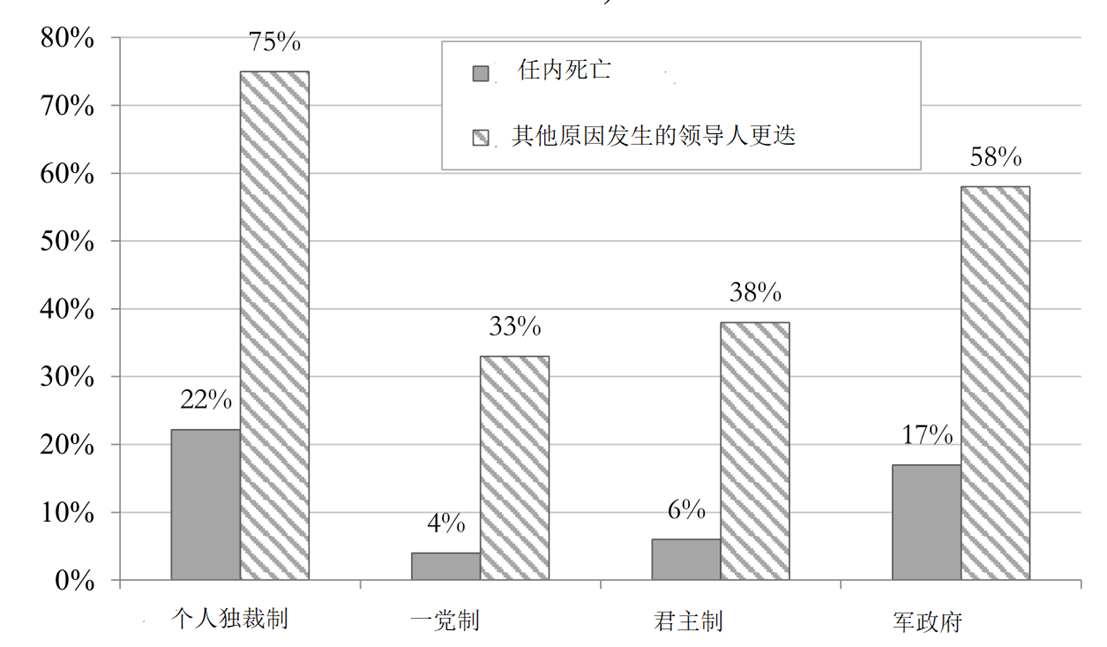
In fact, these scholars found that in all scenarios, the natural death of the incumbent dictator was the least threatening factor to his system. Here are the threats posed to the dictatorship by various factors of change:
Figure 2 Probability of system collapse due to change of incumbent dictator
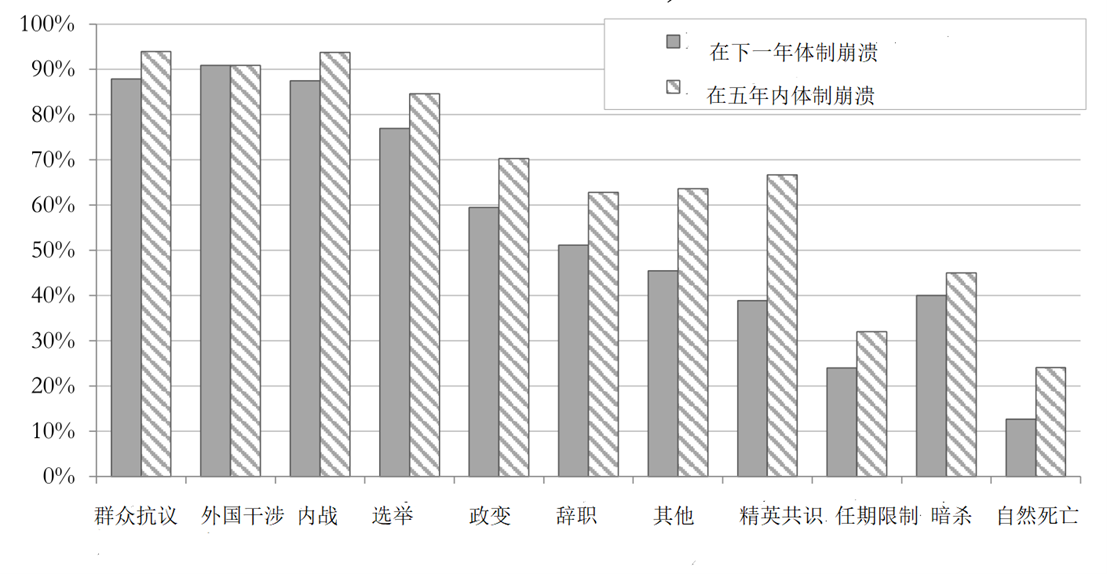
It also makes sense that when a dictator steps down because of mass protests, foreign interference, civil war, and elections, there is a revolution. Coups, resignations to elite consensus, etc., are equivalent to internal divisions of the ruling elite. However, term limits, assassinations, and natural death can actually be regarded as relatively normal forms of power transfer within the regime. From revolution, internal strife to private hand-in-hand, the possibility of the dictatorship being destroyed decreases in descending order.
Other scholars have tested Taylor and their research using different databases, and the answer is consistent: in the absence of major internal and external political crises, it is very unlikely that major political changes will occur if the dictator dies naturally. Other forms of leadership change have had a far greater impact.
If Taylor's research is to be believed, the next question we have to ask is: Is Putin's Russian government a personal dictatorship? Which of the two scenarios at the beginning of this article is most likely to occur? Which subsequent prediction will come true?
two
As I have explained in the previous articles ("The Possibility of Russia's Disintegration" and "Putin's Governance"), the system established by Putin is a semi-feudal system. He is the heir to a weak state, and his efforts to strengthen it have had mixed benefits. In the words of an Italian political scientist, Ottorino Cappelli, "State centralization under Putin should not be seen as a reversal of authoritarianism following the wave of democracy, but rather as a parallel with feudalism in Western Europe." on a par with the pre-modern state-building process centuries after its decline.” In general, Putin still relies rather heavily on an informal, personal power structure to govern, surrounded by “courtiers” and local “vassals.” ".
The semi-feudal system inherited and created by Putin has concentrated the node of power on him alone. This allows the Putin system to be clearly categorized as an individualistic dictatorship. When he was there, everything was easy to talk about, but what if he wasn't there? In 2014, Vyacheslav Volodin, First Deputy Director of the Russian Presidential Administration, gave a speech at a club, saying: "As long as there is Putin - Russia exists, without Putin - there is no Russia. This sentence is indeed true if you leave out the flattery and only focus on the stability of the system.
So, which of the two scenarios at the beginning of this article is most likely to occur? An honest answer: So far, we don't see the answer.
If Putin hadn't started the war in Ukraine, we can almost be sure that Putin's rule would not face serious challenges. Even if he dies (or relinquishes power), the system he created is likely to survive (at least in the short term without risk of collapse), partly because of the Russian state's ability to coerce and extract money under his rule. On the other hand, it is also because it does meet the social welfare needs of some people through the redistribution of oil funds. In other words, Putin was able to command the obedience of the elite and the support of the masses at the same time. According to data from the Levada Polling Center, Putin now enjoys an approval rating of more than 80%. Even taking into account the fact that the Putin regime values/manipulates public opinion to a considerable extent, making poll data suspect of being unreliable, former Putin contributor (and now opposition) Abbas Galyamov estimates , Putin's real supporters still account for more than 40% of the population (opponents are 33%). For a dictator, this approval rating is satisfactory enough. Since he has ruled long enough, there has been some sort of self-sustaining social expectation.
The problem is that Putin did start the war in Ukraine, creating a crisis for his own rule. What were the political implications of this war?
On the one hand, Russia's economy has suffered only a mild recession over the past year (its GDP fell by 2.1%), far short of the 15% that had been expected, even as it was consumed by Western sanctions and war. This shows that the Ukraine war itself has not yet had an economic impact on the Russian masses.
According to Russian public data collected by Mediazona and the BBC News team (including social media posts by relatives of the dead, local media reports, and local government statements), soldiers from Russia's marginal/poor regions (such as the Caucasus and Siberia) Casualties reported by the Russian army were disproportionately high.
Figure 3: Russian Army Casualties
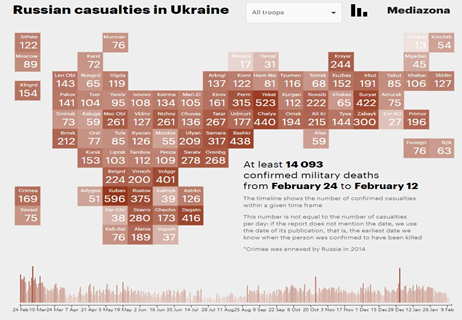
Table 1: Ethnic Inequalities in Russian Military Casualties in 2022
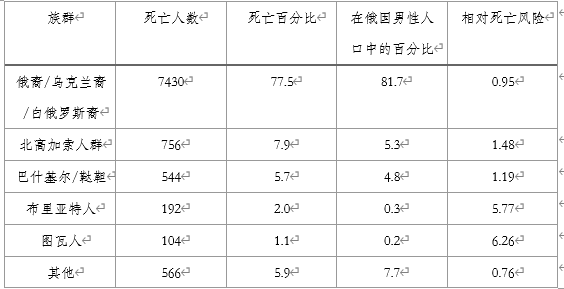
Note: This study only counts the casualties announced by the Russian army as of December 1, 2022
If you don’t look at ethnicity but look at region, the table is as follows:
Table 2: Regional Inequalities in Russian Military Casualties in 2022
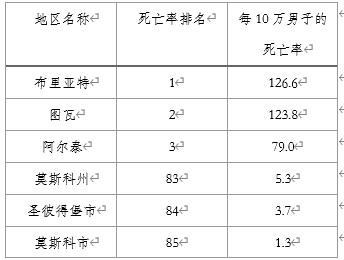
Note: This study only counts the casualties announced by the Russian army as of December 1, 2022
Whether this result is the result of ills in Russia's military mobilization system, the socioeconomic inequalities of Russia's regions (which is most likely), or deliberate discriminatory arrangements, it reflects the fact that war The main pain is still borne by Russia's peripheral regions and populations. So far, the Putin government still declares that this is just a "special military operation", which also shows that the Putin government is conscious and has successfully isolated this war from the people in the core areas of Russia.
This successful isolation is also reflected in the data of the Levada polling center. When Russians were asked if they cared about the situation in Ukraine, the results were as follows:
Figure 4: Responses to "Are you concerned about the situation in Ukraine?"
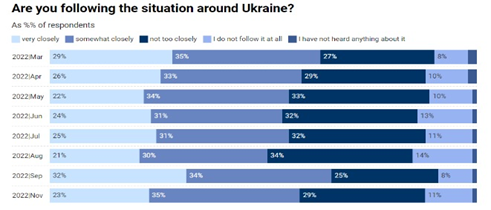
Figure 5: Responses of respondents of different ages

We can see that with the passage of time, Russians' attention to the situation in Ukraine has not increased, but has slowly declined. Members of the 18- to 24-year-old age group, who are most likely to be dragged into the trenches by the scale of war, are the least concerned about the war situation.
Therefore, we can safely believe that there is no possibility of turmoil in Russian society in the near future, and Putin will not be challenged for the time being. If he dies at this time, the possibility of sudden changes in Russia is still low.
But, on the other hand, this war has indeed exposed the weaknesses of Putin's system, with the potential to spark deep discontent and tear the country apart.
It first exposed the fact that the Russian state is not strong (we have discussed in the previous article). It is clear that the quasi-feudal nature of the Putin regime has inevitably put its stamp on its military capabilities: corruption and ineffective government have reduced the efficiency of the military and its logistics; There is also the Wagner Group, the Chechen army (supposedly used as a gendarmerie), the Russian National Guard, etc. According to a report in The New York Times, there is no unity of operations and command among these various military organizations. And we can see news reports of these groups attacking each other (even violent friction). A Russian journalist angrily pointed out that this is "military feudalism". The inefficiency of the military is a manifestation of the poor functioning of the entire country. We can reasonably speculate that due to its weak national capabilities, Russia may not be able to maintain a well-functioning war economy economically for a long time. Once Chinese or Indian demand for Russian oil falls (which seems likely), without large-scale energy exports, the Russian government's central finances will be in a bind. Once this happens, the funds needed for the functioning of local societies will be lacking.
Second, the war dealt a blow to Russia's existing national ideology, creating conflicts between people on the periphery and the core of the country.
In the 1990s, ethnic conflicts within Russia were mainly vertical (federal centers vs. ethnic localities)—in most cases, grievances were directed at the central authorities. However, since Putin came to power and centralized power, with the influx of a large number of ethnic minority frontier immigrant workers into the hinterland of Russia, this vertical conflict has become more of a horizontal (inter-ethnic) conflict. Since 2012, Putin’s government has embraced “Eurasianism”/national imperialism in order to divert the attention of Russian society from internal political corruption, national defects and ethnic struggles in order to achieve the historical reunification of the Russian state To call for unanimous outward. This is similar to Tsarist Russia's turn to pan-Slavism in the last years to resist the wave of revolution. Both want to use external policies to solve internal problems. From the data point of view, this approach has indeed had some effect. Not only has the ethnic Russian population reduced xenophobia, but ethnic minorities have also accepted this narrative. In a 2013 poll, researchers found that 47.3 percent of Russian residents and 53 percent of ethnic minorities were in favor of expanding Russia's territory. There was also no statistically significant difference in their identification with the Russian state. The researchers have an interesting insight—that is, some ethnic minorities may want to return to the "Soviet 2.0 version" to offset the pressure of Russian ethno-nationalism on them in a more pluralistic country.
As mentioned in the previous figure, in the Ukraine war, people from the Russian fringes suffered a disproportionate number of casualties. The picture below is another piece of evidence—casualties of conscripted soldiers:
Figure 6 Casualties of mobilized soldiers in the Russian army
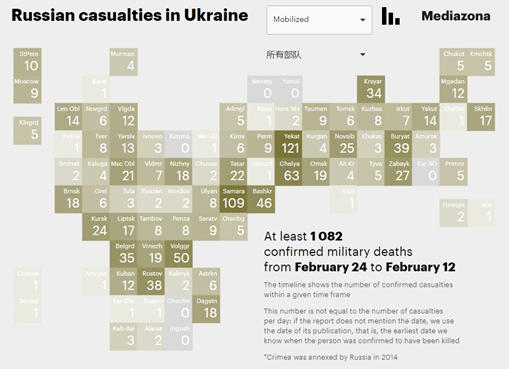
The graph shows that either "some" of the military mobilization conducted by Russia was distributed unfairly across regions, or that conscripts from peripheral regions were sent to more dangerous locations, or both.
There have been some news reports that there are some voices of resistance in some fringes of Russia. Of course, these sounds seem faint. But no matter what, Russia's official ideology seems to be in danger of bankruptcy due to the large gap between Russia's official ideology and the reality of the war, and domestic harmony is no longer there.
Combining the above two trends, it is not difficult to see that if the Ukraine war continues in the future and is unsatisfactory, then the factors that keep the masses in Russia silent will gradually disappear, and Putin will face more and more serious challenges.
three
Let us assume for a moment that the second scenario plays out—at some point in the future, the continued defeat of the Ukrainian war creates widespread discontent among the masses and fragmentation of the elite, and Putin dies unnaturally (either incapacitated or resigned). What exactly will happen next?
If the research results of political scientists are correct, and the historical probability can be established in the case of Russia, then the Putin system is more likely to collapse. Here are two more specific reasons to support this judgment: First, it is generally recognized that whether the ruling elite has the willingness and ability to suppress is the key factor for the maintenance of the dictatorship, and this willingness and ability depends on whether this stratum Unity, willing to share responsibility. And as we discussed in the previous article ("Putin Governs the Country"), the Putin system is a quasi-feudal system, and its powerful departments are fragmented and severely opposed. When the system is facing major internal and external crises and challenges, it is doubtful whether Putin’s henchmen can overcome obstacles to cooperation; secondly, on the surface, Russia is still an electoral democracy, and Putin manipulated, distorted, but did not completely abolish elections mechanism, and Putin's royal party, United Russia, is not a real party and has no ability to control elections. In this way, there is still political and social space in Russia that allows the protests to take place in the first place.
If the Putin system collapses, will Russia be divided?
Now there is a saying that the ethnic minority areas in Russia have been run by Russia for a long time, "the population structure and culture have been highly Russified, and they have long been the basic territory of Russia", so the possibility of Russia's split is not high. This statement has some truth, but it is too absolute. Otherwise, how can we explain that many republics and regions actually had independent tendencies or actions during Yeltsin’s period, and how can we explain that even now, many Russians still expect There will be ethnic conflicts in Russia, so how to explain that people in the Putin regime like Shoigu also compared the Russian Federation to the former Yugoslavia in August last year, saying that the country is in danger of disintegration.
Figure 7: Answers when asked whether there will be ethnic conflicts in Russia this year
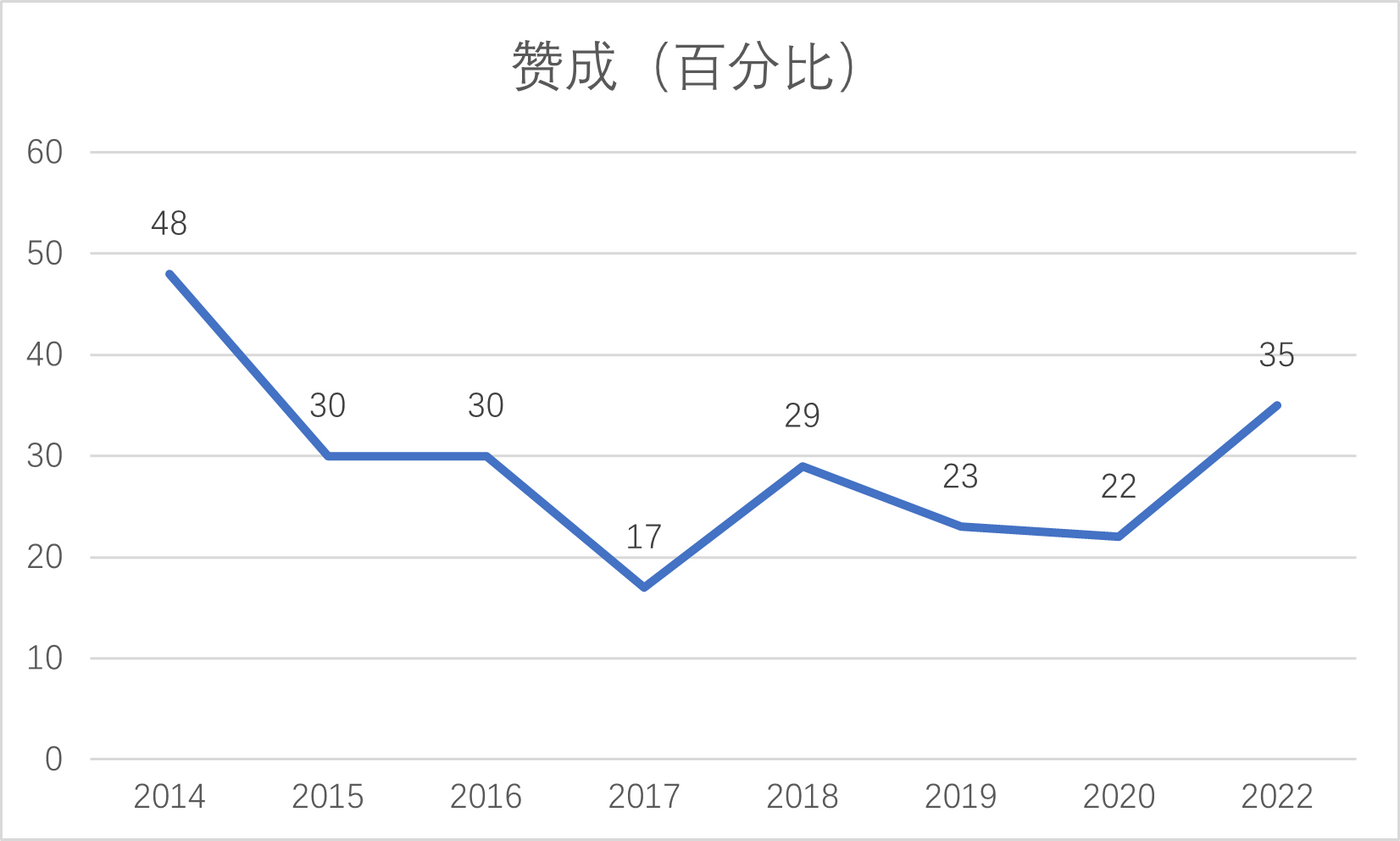
Obviously, Russia is by no means a flawless country. Considering that Putin actually destroyed the federal system, considering that the Russian population is actually withdrawing from the border regions and most of the national republics (to the European part of Russia, this leads to fewer Russians than minority populations in 13 republics , less than 1/3 of the total population in the nine republics)), considering that the way Russia maintains national unity still relies on "schools, the army and the police" (the famous Russian sociologist Lev Gudkov language), considering that most Russian liberals are actually also looking for a fully Russified linguistically and culturally uni-citizen state (which is likely to intensify the confrontational situation). If Putin goes, then what is likely to happen is that Russia will quickly return to what it was before Putin (24 years ago), or worse.
If I had to guess, the one who would backstab Russia first would probably be Putin's good "son" - Ramzan Kadyrov. Since Kadyrov's father was killed in 2004 and Putin supported him to succeed the Chechen president, many researchers believe that the best explanation paradigm for the current relationship between Russia and Chechnya is the "imperial order" (that is, the "imperial order"). Indirect Rule" plus "Feudal Contract"). The Putin-Kadyrov relationship is very much like that between a tsar and a privately loyal sheik. Both on Putin's side and on Kadyrov's side, the personal nature of their relationship is emphasized (Putin once said, "I treat him like a son"). Putin allowed Kadyrov to build a private army, gifted him a lot of money and a lot of medals, and Kadyrov returned loyalty, maintained order in Chechnya, served as a private bodyguard in Moscow, and launched a campaign for the suzerain. It provides military retinues for its foreign wars - from Georgia to Ukraine, the shadow of the Chechen army can be seen everywhere. Some researchers also directly use "buying peace" to describe Putin's actions.
The problem is that, like all empires, Russia faces a proxy problem. With Putin's tacit approval, Kadyrov established an independent kingdom in Chechnya. Although 80% of the Chechen government's budget comes from federal subsidies, without Kadyrov's consent, federal agencies cannot operate in Chechnya, and federal laws cannot be enforced in Chechnya. Moreover, Kadyrov actually controls all the armed forces in Chechnya. As early as 2006, he was given direct leadership of all counterterrorism operations in the North Caucasus. Many observers believe that between Putin and Kadyrov, the benefactor-client power relationship is actually quietly tilting towards Kadyrov.
We can imagine that once Putin loses control of Russia, Kadyrov will probably think that his contractual relationship with the Russian government has been terminated. Moreover, he is unlikely to be the one to unilaterally terminate the contract. As far as public opinion in Russia is concerned, a considerable number of Russians actually regard North Caucasus Muslims as aliens in Russia, and they oppose the federal government's financial assistance to the North Caucasus region. Russian liberal opponent Alexei Navalny chanted "Stop Feeding the Caucasus" in 2011, and here's how the crowd reacted:
Figure 8: Answers when asked if they support "stop feeding the Caucasus"
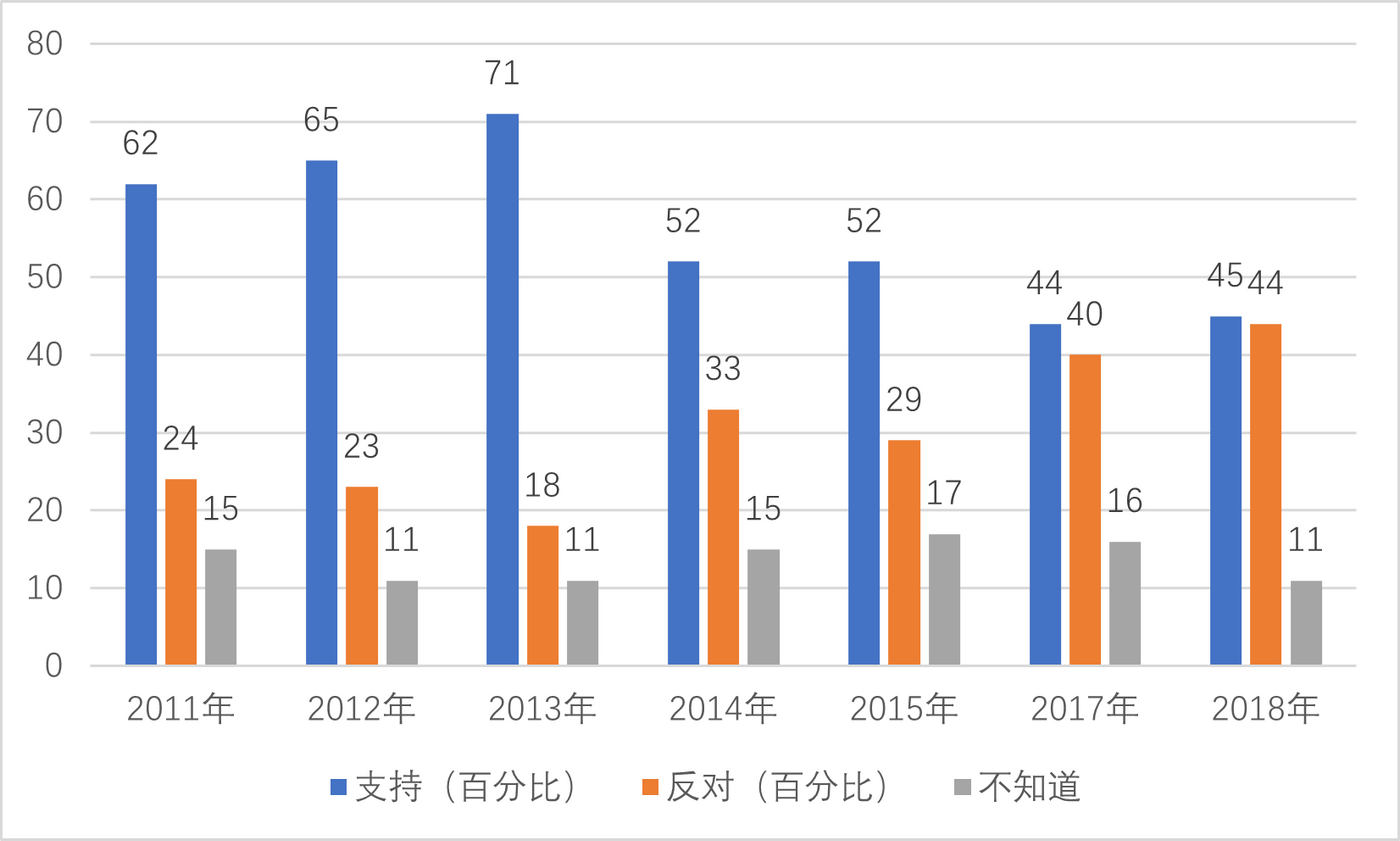
While popular support for the slogan has tended to decline in recent years, I tend to think that this decline is not the result of a decline in ethno-nationalism among Russians and a rise in civic nationalism, but rather a response to anti-Western and imperialist sentiment . Once the Ukrainian war fails, Kadyrov and Chechnya will lose its value. In fact, in a poll conducted in 2013, a small percentage of Russians (about 14%) simply supported the separation of the North Caucasus Muslim republics from Russia.
So I suspect that once the Putin system collapses, if no one is willing to reach a compromise with Kadyrov (continue to provide money), then Chechnya will actually be the first to become independent and do its own thing, while other republics in the North Caucasus, such as Ingushetia and Dagestan will probably be involved by Chechnya.
What about the rest of Russia? I guess while Moscow is busy with civil strife, at least some states and republics will demand real federal principles, some republics will demand special sovereign status, and some republics will start real separatist movements. This is precisely the characteristic of Yeltsin's era. Those places where the Russian population is small or resource-rich, or where the geographical location is more remote, will probably be the most demanding and highest.
In the final analysis, Russia is not a “quasi-unitary nation-state” but a post-empire, without an effective federal system or a civic nationalist ideology that can unify multiple ethnic groups. Even the Russians themselves do not all obey the "centralization tradition", whether it is in the states of Voronezh, Orel, Leningrad and St. Petersburg in the hinterland of Russia, or in the Sverdlovsk state in the Ural region, It is still located in the Irkutsk region of Siberia, and there was a movement to build a republic during the Yeltsin period. Most Chinese researchers believe that these are not real separatism, but just a way for local governments to coerce the central government to gain more economic autonomy. However, this obviously underestimates the resentment towards Moscow in many parts of Russia. American scholar Ganus Bugajeski pointed out sharply, "Regionalists usually think that Moscow is a country within a state, the Muscovites enjoy economic privileges, and the elites here rule its (Moscow) colonies (referring to Russia) other regions)." In fact, the slogan "Stop feeding Moscow" is popular in many places (especially those states and republics that have oil and gas resources but are poor, such as Sakha). "As soon as it is collected, it will die, and as soon as it is released, it will be messed up" is not only a Chinese characteristic, it is the same in Russia. It is also the norm in Russia that the centralization of power is no longer there, and the localities take the opportunity to flee/take a breath. Of course, these scenarios may not happen suddenly, and may slowly emerge as the situation continues to turmoil.
Perhaps in some places, Russian ethnonationalists and imperial nationalists also organized their own political movements, creating militias under the pretext of defending ethnic Russians in the republics, resisting regional independence movements, and preventing state collapse. Terrorism, low-intensity armed conflicts and even civil wars would ensue. If this happens, then the true Yugoslavization of Russia may not be impossible.
In short, in modern history, Russia has undergone two major disintegrations. The first time was the collapse of Tsarist Russia after the First World War, and Poland and Finland separated from Russia. The second was the collapse of the Soviet Union after the defeat in the Cold War, when the three Baltic states, former Polish dependencies (Belarus and Ukraine), the Caucasus states, and Central Asian states seceded from Russia. After each secession, Russia naturally became "smaller"—here referring to both geographical size, ethnic composition, and inclusive character. In fact, a country will not be easier to manage and easier to achieve unification because the more homogeneous its population is. In a way, Russia today is reminiscent of the last moments of Ottoman Turkey. At that time, Ottoman Türkiye had lost North Africa, the Middle East and the Balkans. It is common for empires to decline and their edges to be lost. But we have seen that the divisions that occurred in the Ottoman Turkish Empire gradually went from the skin to the heart. Armenians and Jews (to some extent, including Greeks and Kurds along the coast of Asia Minor) were originally model minority groups in the empire, and they were widely distributed in Anatolia (in a clear state of large scattered and small settlements) ), and actively intervened in the economic life of the empire, but in the end they were all loyal. For no other reason than, in its final phase, imperial ambitions were combined with the concept of "Turkism" and a dictatorial government.
Whether Russia will usher in a third shock based on historical inertia can only wait and see.
Like my work? Don't forget to support and clap, let me know that you are with me on the road of creation. Keep this enthusiasm together!








